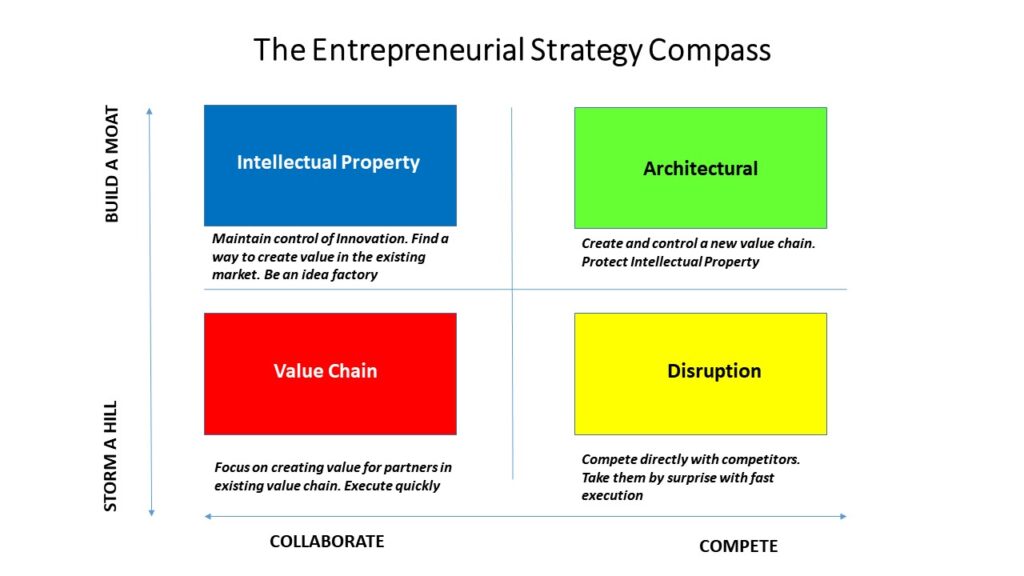Introduction
In a bid to hit the market early, many startups move ahead with the first strategy that comes to mind. In the process, they lose out to even second or third movers who have a superior strategy. On common error that startups make is the search for one strategy that fits everything. There is a lot of uncertainty regarding the consequences of the choices you make. The other error is to think that since there is so much uncertainty, to go with whatever comes to mind. Taking a leap. The first approach leads you to a fruitless and too long a search. The other leads you to leap in without thinking what options are cut off.
And what is suggested in the interim is, OK, don’t plan forever. What we want you to do is we want you to consider some options in a systematic way. And then basically you’re going to come down to one, two, maybe more, and then you just choose. By doing a little bit of work, you will perhaps even go with your gut, but at least you could discard bad options, and you can discard options that are going to really cut you off from doing other things in the future.
The Entrepreneurial Strategy Compass
The framework for the entrepreneurs developed by the Joshua Gans, Erin L.Scott and Scott Stern, will help you, the entrepreneur, think differently about problems.
The simple quadrant will help entrepreneurs think about your strategic orientation as a new company. Basically, the questions are:
• Do you collaborate or compete? (attitude towards incumbents)
• Do you build a moat or storm a hill? (attitude toward the innovation)
Collaborate or Compete
This means seeking support of a larger player in the market, and utilise the resources and supply chain of the larger partner, to enter a large market quickly and successfully. The downside to this approach is how much bargaining power you will hold in the relationship.
Competing against established players means the startup has more freedom to build the organization and the value chain that it envisions. However, this necessitates backing up of a larger financial resource, and infrastructure.
Build a moat or storm a hill
Building a moat, means the company can gain from having a tight control over product and technology through IP (Intellectual Property). IP is expensive but it can insulate the startup from direct competition. The challenge is brining innovation that benefits the customers and the market.
In contrast, a startup concentrates on quickly going to the market and speeding up commercialisation. This is effective provided the startup has an appetite to experiment and iterate on their idea directly in the market place.

Explaining the Strategies
The Intellectual Property Strategy and Disruption Strategy
These two strategies show the diverse approaches a startup can approach the market with. The Intellectual Property strategy involves the entrepreneur bringing something new to the market – a product or a technology, maintaining legal ownership of the product, and seeking to collaborate with already established players.
The opposite of this is the Disruption Strategy where the startup or entrepreneur is looking to take established players ‘head on’ and looking to shake the market.
The Value Chain Strategy and the Architectural Strategy
“The value chain strategy” shares somewhat similar to the disruption strategy since it involves competing, but not too aggressively. An entrepreneur who employs this method becomes the new member of the market, a member seeking to seek out his/her own share.
The Architectural Strategy
This is probably the most difficult strategy, since this involves creating a completely new value chain, one outside the existing established market. Entrepreneurs who create this value chain try to prevent others from entering it.
With this strategy, start-ups can compete and achieve control. It is out of reach for many if not most ideas. It is feasible but risky. The social media industry is full of examples of this strategy. Facebook and Google and prime examples.
Conclusion
No one strategy is the best strategy. One particular startup may be better suited for a particular strategy than the other three. The above framework will help to design the choice successfully and channel imagination toward the realisation of founders’ ideas.
Credits:
Inputs from the Harvard Business Review Article “Strategy for Startups”
Puneet Mathur is a Certified Life Coach, Certified Business Coach and a Certified Organization Development Coach. He specialises in helping business leaders to transform their enterprise into a professionally run Company by implementing state of art systems and processes, and building a highly motivated team.
Puneet is an experienced business leader, with about 30 years of Corporate Leadership experience in reputed Multi National and Indian Companies in the FMCG and Chemicals sector.
He started his career with Britannia Industries as a Management Trainee. He has worked varied roles in Britannia Industries Ltd. Marico Industries Ltd. Coca Cola, and the Jubilant Bhartia Group. His last corporate stint was with Jubilant Industries Ltd. As Senior Vice President and Business Head of a strategic business unit (SBU, Puneet supervised Global Business Development, Global Key Account Management, Manufacturing R&D & New Product Development.
Puneet has extensive experience in Sales & Distribution of FMCG products and Speciality Chemicals (B2B business). He has a rich experience of expanding distribution reach, Sales Force Productivity, International Business Development, and Exports.

Email: pmathur@principiumadvisory.in mail@puneetmathur.in Websites: www.principiumadvisory.in www.puneetmathur.in Blogs www.principiumcoaching.blogspot.com www.principiumcoaching.wordpress.com




Such a well researched article. Kudos. Keep up the good work